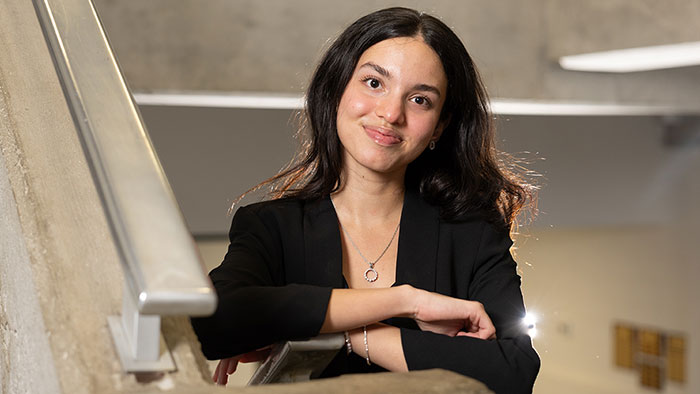Spotlight date | December 3, 2024
Becoming a force in her field
The sky is no limit for Yashasvi Moon. Her passion for science is leading her toward universal discoveries.
What do physics, math and astronomy have in common?
They study and explain the workings of the universe.
For Yashasvi Moon, all three of these sciences are the fuel for her undergraduate research.
Double majoring in physics and mathematics, Moon proves to be a hard-working problem solver.
In spring 2021, she began her first semester at Missouri State as an international student from Napur, India.
“MSU has been very welcoming of international students, which I really, really appreciate,” Moon said.
She chose to attend Missouri State after receiving one of MSU’s international student scholarships, which she said was “very financially good for me and my family.”
Gravitating toward multiple sciences
During her time at Missouri State, Moon has been developing a passion for physics that she’s had since she was very young.
“I just really liked physics as a kid,” Moon said. “My mom is a biochemist, so she would take me to her lab when I was little and show me her experiments and everything. That was really cool. I think that, initially, got me into science.”
In her first year at MSU, Moon chose to take the career prep physics track, a general physics degree option designed to prepare students for the workplace.
“I really liked [physics], because it explained stuff like the natural phenomena around me...It can help us test theories, and it can explain stuff around us.”
Within the last three years, however, Moon’s interests began to evolve, so she added an astronomy track to her physics degree.
Igniting a spark for physics in young minds
As an active student in the physics department, Moon participated in community outreach events, where she and other physics students would explain and demonstrate physics phenomena to local school children.
“I feel like we don’t really see women scientists a lot, so I feel like it helps to have a role model – or not even a role model, but just a woman, like a physicist or a scientist who is there for inspiration to younger girls who would want to pursue STEM,” she said.
Moon is also the vice president of the Society of Physics Students (SPS) on campus.
“I recently initiated or started a collaboration – which I hope is going to continue – with the newly-established Women in STEM club of MSU,” Moon said.
Recently, she united the two groups for an outreach science demonstration at Greenwood Laboratory School.
Orbiting around research opportunities
Moon knows that the road to graduate school means reaching out to external universities to secure an REU (i.e. Research Experiences for Undergraduates).
After a lot of persistence, she secured an REU at the University of Illinois Urbana-Champaign in summer 2023. It was during this experience that she uncovered her fascination for astronomy.
“I picked out a book. I just started reading it, and it turned out astronomy really interested me,” Moon said.
In summer 2024, Moon secured another REU, where she identified 9,000 new galaxies that host tidal disruption events, a phenomenon that occurs when a star is torn apart after approaching a black hole.
“Words of advice for physics students, specifically, is to get into research. The sooner you get into research, the better,” Moon said. “Also, again, the path is not linear. My path was all over the place. I first liked physics, then I liked math, and now I’m into astronomy. I never thought I would do astronomy.”
Her future’s written in the stars
Along with research, Moon was supported by constructive courses and knowledgeable faculty.
“I think the classes that I’ve taken and everything, they’ve been very, very helpful. Like the physics classes. Like quantum mechanics with Dr. Mitra. That was one of the best classes I’ve ever taken, and I just got so much out of it,” she said.
Moon also acknowledges Dr. David Cornelison for his efforts in organizing the physics outreach events and fostering her passion for physics.
“One last thing about the physics department, they’ve just been extremely, extremely supportive in whatever our students want, not just me.”
Moon expects to graduate in May 2025.
She is in the process of submitting applications to graduate school. Moon hopes to get her PhD in either astronomy or astrophysics.
“After that, I do want to be a professor and teach and simultaneously do research, because I really like to teach or just explain stuff to students,” Moon said.
